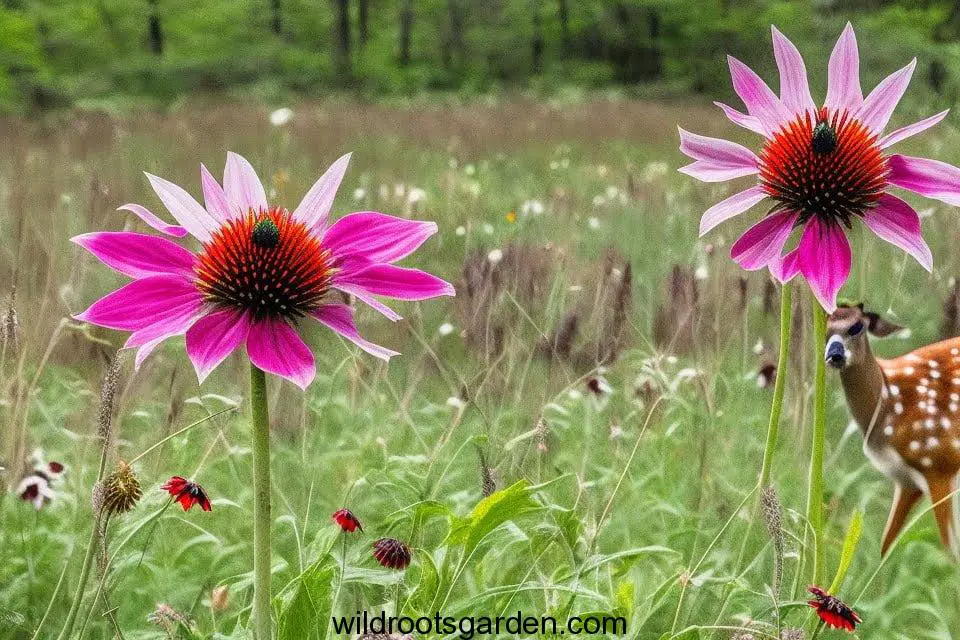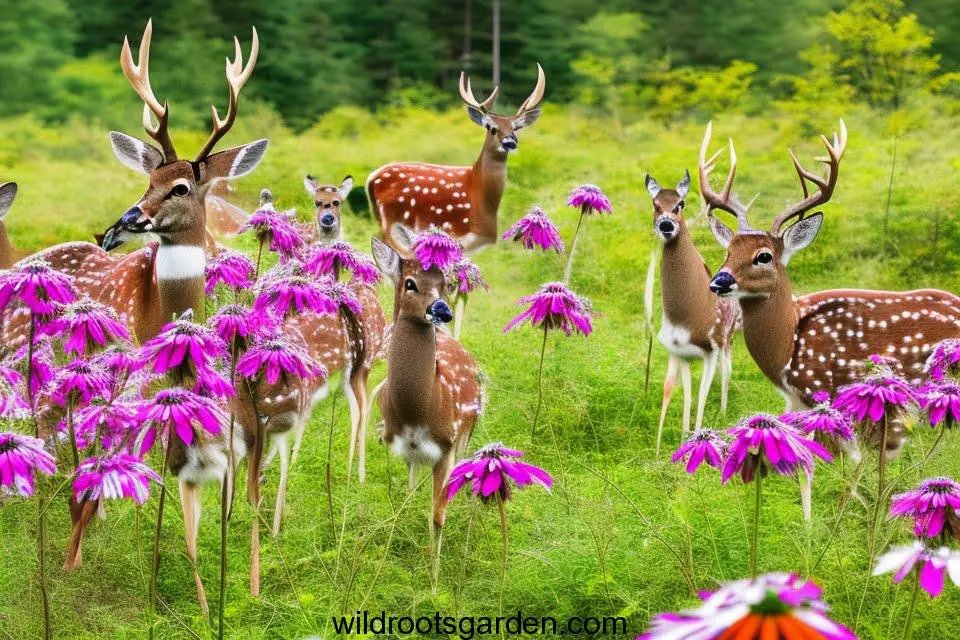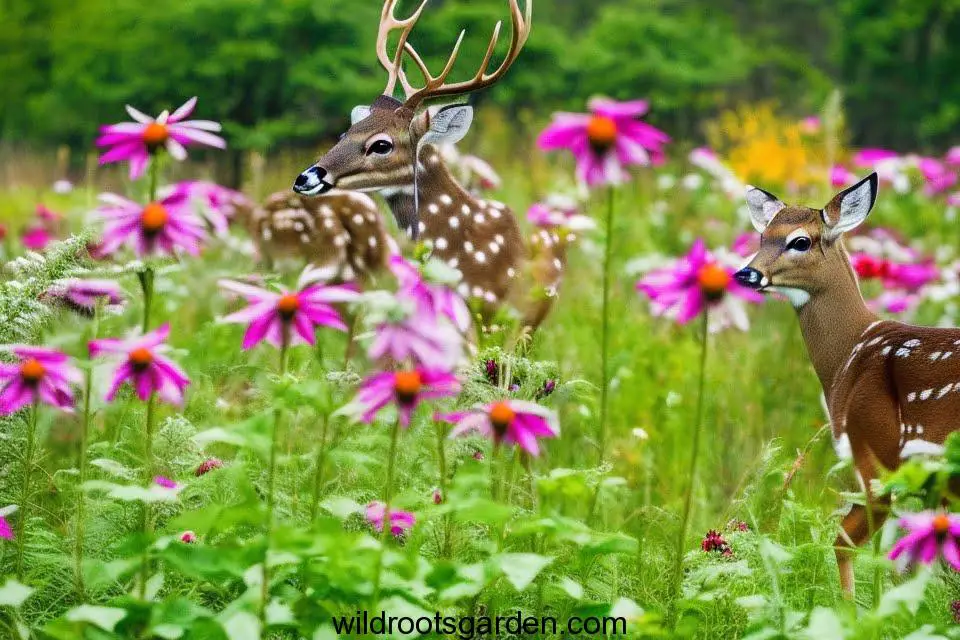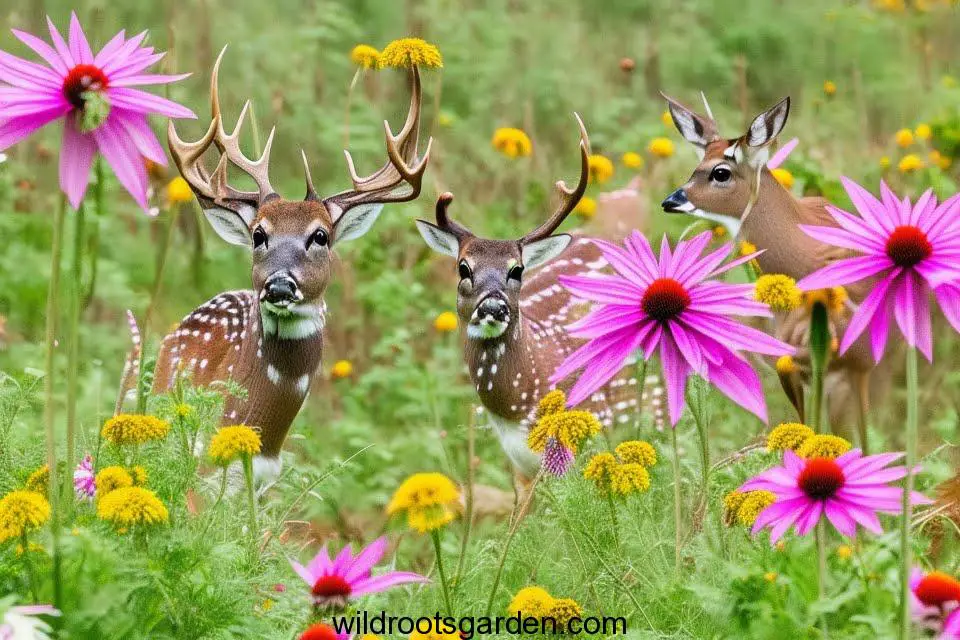Coneflowers are typically thought to be resistant to deer. Deer don’t enjoy the taste of them since it is powerful and harsh. It’s crucial to remember that no plant is entirely resistant to deer, and young or recently planted coneflowers may still get nibbled on.
Introduction
Dealing with deer damage is one of the difficulties that gardeners encounter when it comes to maintaining a lovely garden. Gardeners often become annoyed by deer’s propensity for nibbling on their plants and look for deer-resistant choices. Coneflowers are a favorite among garden enthusiasts because of their striking hues and durable blooming. This essay will examine the deer resistance of cone flowers and offer tips for designing a deer-resistant landscape.

What is Cone Flowers?
Known formally as Echinacea, cone flowers are a genus of blooming plants that are indigenous to North America. Their prominent cone-shaped centers on daisy-like petals make them highly sought after. Coneflowers, which come in a variety of hues such as purple, pink, and white, are a lovely addition to any landscape. These resilient perennials are well-recognized for drawing pollinators like butterflies and bees.
Deer Damage to Gardens
Gardens can sustain severe damage from deer, especially in locations where they are prevalent. They are known to graze on a variety of vegetation, including fruits, vegetables, and decorative flowers. This is a problem for gardeners who want to keep their gardens looking good and functioning well. Under such circumstances, identifying deer-resistant plants becomes essential.
Characteristics of Deer-Resistant Plants
Deer-resistant plants possess certain characteristics that make them less appealing to deer as a food source. These plants often have:
- Strong fragrances: Plants with strong scents, such as herbs like rosemary and lavender, tend to be less attractive to deer.
- Fuzzy or hairy leaves: Plants with fuzzy or hairy leaves, such as lamb’s ear or yarrow, are less palatable to deer due to their texture.
- Bitter taste: Some plants have naturally bitter or unappetizing flavors, deterring deer from consuming them.
- Toxic compounds: Certain plants contain toxic compounds that make them unappealing or harmful to deer if ingested.

Are Cone Flowers Deer Resistant?
Coneflowers are typically thought to be resistant to deer, though this resistance varies. Coneflowers are not normally a favored food source for deer, though they may occasionally nibble on them if other food sources are scarce. Coneflowers have a little bitter flavor due to the chemicals they contain, which may dissuade deer from eating them. The deer will consume nearly any plant, including cone flowers, in times of high deer population or food scarcity, it’s vital to remember.
Factors Affecting Deer Resistance
Several factors influence the deer resistance of cone flowers or any other plant:
- Deer population: Areas with a high deer population pose a greater risk of deer damage, even to supposedly deer-resistant plants.
- Food availability: If deer have an abundant food supply, they may be less likely to target cone flowers or other deer-resistant plants.
- Seasonal preferences: Deer may show preferences for certain plants during different seasons, depending on their nutritional needs and availability.

Deer-Repellent Strategies
To protect your garden from deer damage, you can employ various deer-repellent strategies:
- Fencing: Installing a sturdy fence around your garden is one of the most effective ways to keep deer out.
- Natural deterrents: Certain plants, such as lavender, mint, and marigolds, have scents that repel deer. Planting them strategically around your garden can help deter deer.
- Repellent sprays: Commercial deer repellent sprays, containing ingredients like garlic or predator urine, can be applied to plants to make them less appealing to deer.
- Motion-activated devices: Motion-activated sprinklers or noise-making devices can startle and scare deer away from your garden.
Conclusion
Therefore, despite the fact that cone flowers are typically thought of as being deer resistant, their resistance may differ based on variables like the deer population and the availability of food. Coneflowers and other deer-resistant plants can help lessen the possibility of deer damage in your landscape. To secure the safety of your plants, however, you must use extra deer-repellent techniques.
FAQs
- Are cone flowers safe for pets? Coneflowers are generally safe for pets when consumed in small quantities. However, it’s always advisable to consult with a veterinarian if you suspect your pet has ingested a significant amount of cone flowers.
- Do deer eat all types of cone flowers? While deer may nibble on cone flowers, they are not typically their preferred choice. Some varieties of cone flowers may be less appealing to deer than others.
- Can I plant cone flowers in a deer-heavy area? Planting cone flowers in a deer-heavy area can be a gamble. While they are generally deer resistant, the level of deer damage can vary depending on the local deer population and food availability.
- Do cone flowers require any special care? Coneflowers are low-maintenance plants, but they thrive in well-drained soil and full sun. Regular watering and deadheading can promote healthy growth and prolonged blooming.
- Can I use homemade deer repellents for my garden? Homemade deer repellents, such as garlic or hot pepper sprays, can be effective in deterring deer. However, their potency and longevity may vary, so it’s recommended to test them on a small area before applying them to the entire garden.

